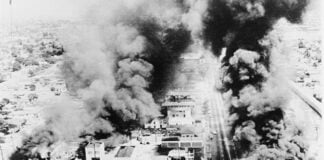Review: The Reader
Directed by Stephen Daldry, In cinemas now
The Reader is a story of illicit love, of betrayal and guilt, and of redemption. Kate Winslet won the Oscar for Best Actress for her portrayal of Hanna Schmitz, and David Kross is outstanding as Michael Berg, her schoolboy lover.
But it was not the torturous path of the two characters’ relationship or the quality of their acting that attracted media attention in the run-up to the Oscars. Instead, the movie was widely attacked as a piece of Holocaust revisionism. Jewish groups in the US campaigned against it.
Ron Rosenbaum, writing for Slate.com, was typical of many. “This is a film whose essential metaphorical thrust is to exculpate Nazi-era Germans from knowing complicity in the Final Solution… [it] asks us to empathise with an unrepentant mass murderer and intimates that ‘ordinary Germans’ were ignorant of the extermination until after the war.”
The criticisms echo an influential book, Hitler’s Willing Executioners: Ordinary Germans and the Holocaust, by Daniel Goldhagen, which argues that the German population were aware of, if not involved in, the mass murders.
In The Reader, we discover that Hanna was an SS guard at Auschwitz and that, during a death march in the closing days of the war, she was one of those responsible for the deaths of 300 Jews locked in a burning church.
She is so ashamed of her illiteracy that she accepts total responsibility for the church deaths, rather than admit it.
Michael, who read to Hanna during their love-making in the late 1950s, is disgusted by the hidden truth about his first and deepest love. He fails to speak out for her and in 1966 she is sentenced to life in prison.
Wracked by guilt, he reads books on to tapes for her in prison, which inspires her to learn to read. The critics see this as trivialising her crimes. Yet Michael cannot forgive her and, ultimately, Hanna’s books become not a path to freedom but a stepping stone to her death.
Does the film deserve the criticisms heaped upon it?
The central theme of The Reader is not the Holocaust, but love and betrayal. This is not a film about the Final Solution, but a film about how its horrors fatally wound a deep first love. The pivotal moment is not Hanna’s admission of war crimes, but Michael’s failure to support her. Far from excusing the Holocaust, Michael is so appalled that he cannot speak out for his former lover.
He visits a death camp and walks through prisoners’ quarters, through gas chambers, and, in an exquisitely poignant moment, through a warehouse of victims’ shoes, tens upon tens of thousands of them stretching into the distance.
This is not a film that sugarcoats mass murder. Neither does it hide it. As one of Michael’s fellow law students says, the camps were everywhere, everyone knew.
But knowing is not the same as assenting. Hanna justifies her decision to let the Jews burn on the grounds that she and her fellow guards had a responsibility to prevent them fleeing. It is an admission of rational madness. The courtroom sucks in its collective breath as it considers the implications.
All we know of Hanna is that she was a young woman who worked in a factory and for whom becoming an SS guard was about promotion and excitement. Trapped in the killing machine, she was responsible for failing to protest, but not responsible for Hitler’s agenda.
To ascribe to Hanna responsibility, and beyond her the German working class, is to ignore the mass working class opposition to the Nazis before 1933. What else is dictatorship than an acknowledgement that the regime can achieve its ends only by force against its own population?
Before Michael’s betrayal, before Hanna’s crimes, came the smashing of unions and the Left by the Nazis. Above the death camp gates was the cynical slogan, Arbeit Macht Frei—Work Sets you Free. But no death camps could be built until the workers in Germany’s factories were deprived of all their freedoms.
Hanna was a perpetrator of mass murder, but a victim, too. The brilliance of The Reader is its capture of that terrible torment.
By David Glanz





